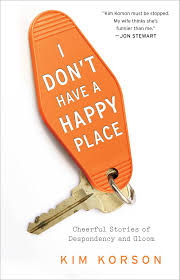Reviewer: Allie
 I received a review copy
I received a review copy
Summary:
When a trip to the therapist ends with the question “Can’t Kim be happy?” Kim Korson responds the way any normal person would—she makes fun of it. Because really, does everyone have to be happy?
Aside from her father wearing makeup and her mother not feeling well (a lot), Kim Korson’s 1970s suburban upbringing was typical. Sometimes she wished her brother were an arsonist just so she’d have a valid excuse to be unhappy. And when life moves along pretty decently–she breaks into show business, gets engaged in the secluded jungles of Mexico, and moves her family from Brooklyn to dreamy rural Vermont—the real despondency sets in. It’s a skill to find something wrong in just about every situation, but Kim has an exquisite talent for negativity. It is only after half a lifetime of finding kernels of unhappiness where others find joy that she begins to wonder if she is even capable of experiencing happiness.
In I Don’t Have a Happy Place, Kim Korson untangles what it means to be a true malcontent. Rife with evocative and nostalgic observations, unapologetic realism, and razor-sharp wit, I Don’t Have a Happy Place is told in humorous, autobiographical stories. This fresh-yet-dark voice is sure to make you laugh, nod your head in recognition, and ultimately understand what it truly means to be unhappy. Always.
Review:
I Don’t Have a Happy Place is a collection of personal essays written by Kim Korson. The essays are presented in chronological order, beginning with the author as a young girl in the first chapter. Korson starts the book off with a bang. At five years old, she witnessed a tragic event that in all likelihood was what triggered her inability to find a happy place – but that’s only my opinion (and I’m no psychiatrist). It was obviously a momentous event in her life, because she remembers it in great detail. She manages to balance the sadness of that summer with humor and wry reflections about her childhood jealously of her best friend. Reading the first essay, I was nervous that the book was going to be a real downer, but fortunately that’s not the case.
Korson goes to college and then moves to New York City, working at a series of low-paying jobs while waiting for a big break into show business. The essays about these years particularly resonated with me, because I remember the dissatisfaction I felt with “adult life” in my early twenties, wondering if my dreams would ever come true. Korson reconnects with an old college friend, Buzz, whom she dates, breaks up with, gets back together with, and then decides again to break up with him again. But then Buzz proposes. For the record, I loved Buzz. For my fellow Jen Lancaster fans, he’ll remind you her husband, Fletch!
The author gets married, has children, and moves to a small town in Vermont. Like most of us, she’s lost loved ones (there’s a funny funeral story), worried about having children, and questioned how our parents affected the way we turned out. All typical and relatable to the reader.
I love reading memoirs, especially about strong women. Kim Korson is a very talented writer with a unique voice, who pulls you in with her ability to tell a riveting story. Her descriptions of people and places are vivid and detailed. She’s clever and witty and her sharp observations will have you nodding your head in agreement. Korson and I are the same age, and there’s not one cultural reference she made that I didn’t recognize and feel nostalgic about. This is Our Story?, hands down my favorite chapter, exemplifies her talent as a writer. I also loved the way she concluded the book with the essay, I Don’t Have a Happy Place (and the question, “Why can’t Kim be happy?”). Although I enjoyed the book, I didn’t love-love it. I think the reason is that Korson is a glass-is-half-empty type of person, whereas I’m of the glass-is-half-full variety. Still, it’s a fun and entertaining read.
